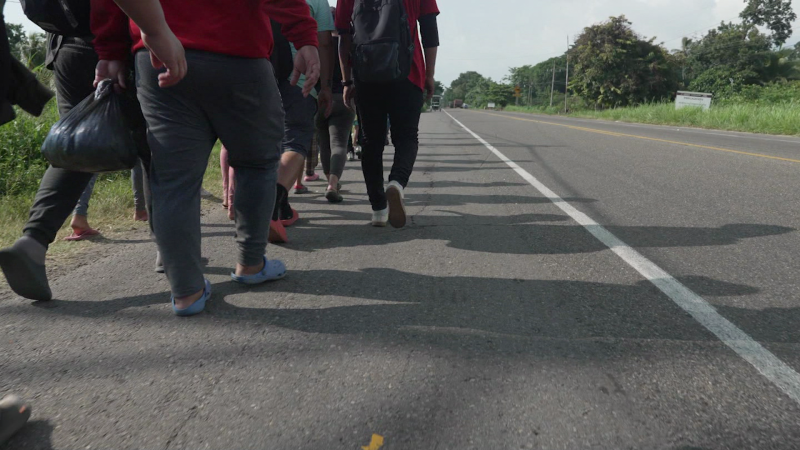
Families weave through long grass to dodge migration checkpoints
A couple of dozen people pile into a van meant for 13. They’ve crossed a river on a makeshift raft and hope to ride 20 or so miles to get to their next stop. But after a short while, the van stops and everyone has to get out.
The passengers – children and their parents, older couples and single adults – have paid to get from Ciudad Hidalgo in Mexico, a small town on the border with Guatemala, to Tapachula, the nearest city.
But they entered Mexico without permission or papers so the van driver tells them to duck around a checkpoint and get picked up on the other side by him or another vehicle.
The families grab their belongings and head along a tarmacked path as we join them, long grass mostly hiding them from the view of the highway and Mexican officials.
It’s no secret that this is happening, just as everyone knows about the rafts bringing people across the Suchiate River and the international border.
Occasionally, Mexican officials shout out across the grass to the walkers and tell them to come back to the main road.
No one pays the officials any notice. The migrants just keep marching, at times signaling to each other to crouch lower to keep out of view.
We saw no officials bothering to chase them as they walked the unofficial migrant route, just yards from National Route 200 that heads from the border northward.
This static game of cat and mouse will play out several times past several checkpoints on the route. Each stop leads to a trek of 20 or 30 minutes and nerves about whether the promised transport will be there on the other side.
In Tapachula, they said they planned to request asylum or permission to transit Mexico legally in hope of reaching the United States.
Two families from Venezuela said it would be their first contact with officials since fleeing their troubled country. They say they have traveled through Colombia, Panama, Costa Rica, Nicaragua, Honduras and Guatemala.
By sunset, they reach Tapachula, their stop for the night. They may be in the city several days, but none expect to stay forever.
Their eyes are set on the US – “el pais de oportunidades,” the land of opportunity, they say.
Tears well up in one woman as she sits back in a van after one checkpoint is skirted successfully. A fellow traveler tells her to perk up. “Didn’t you want the American Dream?” he calls out. “Hold onto that.”
